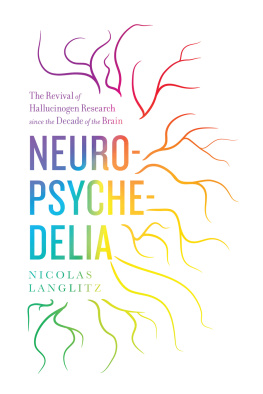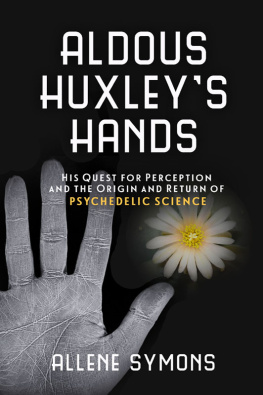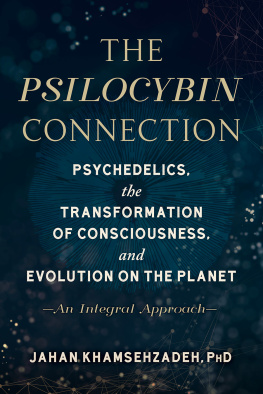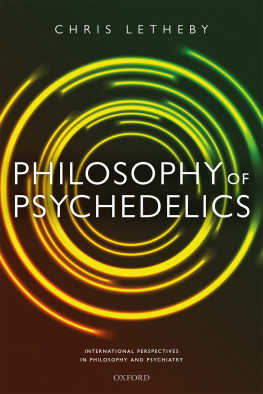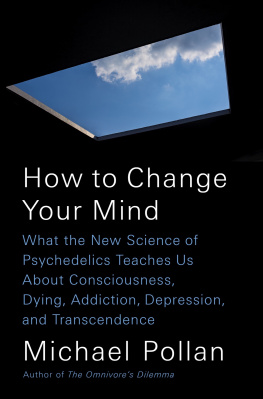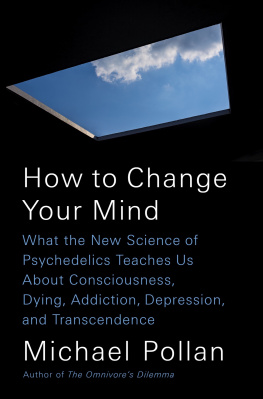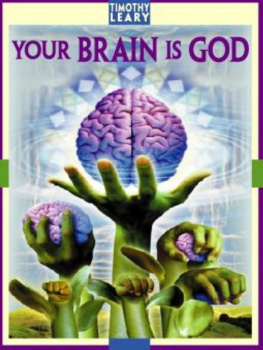
Neuropsychedelia
Neuropsychedelia
The Revival of Hallucinogen Research
since the Decade of the Brain
Nicolas Langlitz

UNIVERSITY OF CALIFORNIA PRESS
BerkeleyLos AngelesLondon
University of California Press, one of the most distinguished university presses in the United States, enriches lives around the world by advancing scholarship in the humanities, social sciences, and natural sciences. Its activities are supported by the UC Press Foundation and by philanthropic contributions from individuals and institutions. For more information, visit www.ucpress.edu.
University of California Press
Berkeley and Los Angeles, California
University of California Press, Ltd.
London, England
2013 by The Regents of the University of California
Library of Congress Cataloging-in-Publication Data
Langlitz, Nicolas, 1975.
Neuropsychedelia : the revival of hallucinogen research since the decade of the brain / Nicolas Langlitz.
p. cm.
Includes bibliographical references and index.
ISBN 978-0-520-27481-5 (cloth : alk. paper) ISBN 978-0-520-27482-2 (pbk. : alk. paper)
eISBN: 9780520954908
1. Hallucinogenic drugsResearch. 2. Neuropsychopharmacology. 3. Hallucinogenic drugs and religious experience. I. Title.
BF209.H34L36 2013
154.4dc23
2012022916
Manufactured in the United States of America
21 20 19 18 17 16 15 14 13
10 9 8 7 6 5 4 3 2
In keeping with a commitment to support environmentally responsible and sustainable printing practices, UC Press has printed this book on 50-pound Enterprise, a 30% post-consumer-waste, recycled, deinked fiber that is processed chlorine-free.
It is acid-free and meets all ANSI/NISO (z 39.48) requirements.
Cover image and design: Thomas Ng
Contents
Acknowledgments
Although I happen to be an anthropologist not primarily interested in cultural differences, let me point one out: in Germany, we keep acknowledgments short or omit them altogether (somewhat in the spirit of the proverb Nix gesagt ist genug gelobt: nothing said is praise enough). In American academic publishing, by contrast, this peculiar genre has come to blossom and sprawl exuberantly since the late twentieth century. A critical and reflexive ethnographic gaze has unmasked these public expressions of gratitude and confessions of intellectual debt as a form of gift giving that promotes the cohesion of a scientific community as well as the authors career by repaying elders for their guidance and protection through displays of reliance, esteem, and loyalty (Ben-Ari 1987). However, following the ethos of the ongoing revival of psychedelic research, which has given up the countercultural rebellion against social conventions and the power of science, this book aspires to be reflexive but not critical. Thus, its German author will do his best to be a good participant observer and join in the ritual of acknowledgments, if not as lavishly as might be expected in an American publication these days.
Gratitude is heaven itself, says Blakeand I know now exactly what he was talking about, wrote Aldous Huxley after his experiences with mescaline and LSD. The drugs had helped him understand many of the more obscure utterances to be found in the writings of the mystics, he claimed, for example, the unspeakable sense of thankfulness for the privilege of being born into this universe. Being more Kantian than Swedenborgian in temperament, I will not chime in with this lyric enthusiasm, but I believe I also have an inkling of what Blake and Huxley meant (and, to the extent that a person rather than a molecule could claim credit for this insight on my part, it would be Mgl Andrews whose Sufic spirituality strangely infused my persistent materialism). However, what seems to make the mere fact of existence a privilege rather than a curse is the company of family, friends, colleagues, and students whom I would like to thank.
Among these numerous people, I am particularly grateful to Franz Vollenweider and Mark Geyer, who were kind and trustful enough to host this anthropologist in their laboratories and endure his nagging questions; my dear friends Boris Quednow and Felix Hasler, who shared so much more with me than juicy stories (better to be published in a later edition) and their office; and all their most generous and forthcoming coworkers populating the pages of this book. I would also like to express my heartfelt gratitude to Paul Rabinow for his intellectually fostering and fondly caring mentorship in the trenches of the Anthropology Department at Berkeley. Lorraine Dastons Department II and especially Fernando Vidals Cerebral Subject research group at the Max Planck Institute for the History of Science in Berlin provided an atmosphere of scholarly leisure, academic rigor, and intellectual stimulation that facilitated postdoctoral rumination of my ethnographic findings. In the course of this, the Volkswagen Foundations European Platform for Life Sciences, Mind Sciences and the Humanities provided an experientially rich opportunity to rethink the relationship between ethnography, philosophy, and neuroscience in ways that I can only begin to articulate in this book. My colleagues and students at the New School for Social Research in New York must take credit for creating and sustaining a warm and vibrant milieu, in which I feel at home as in no other institution before. I could go on and on and there would at least be an anecdote to tell in appreciation of every single person. But since this will either happen in the chapters to come or is really between me and the wonderful people who have helped this book see the light of the day, I will not even try to clear my debts. Instead I sincerely apologize for the formalist brevity and list the remaining benefactors in alphabetical order: Daniel Allemann, David Andel, Peter Andrews, Matthew Baggott, Oliver Bosch, Philippe Bourgois, Rudolf Brenneisen, Scott Brown, Carlo Caduff, Rael Cahn, Suparna Choudhury, Adele Clarke, Lawrence Cohen, Philipp Csomor, Talia Dan-Cohen, Jrg Daumann, Rick Doblin, Richard Doyle, Paul Dietschy, Hubert Dreyfus, Alex Gamma, Gantt Galloway, John Gilmore, Euphrosyne Gouzoulis-Mayfrank, Jeffrey Guss, Michael Hagner, Anne Hermann, Lawrence Hirschfeld, Dominique Holstein, Amelie Ulrika Magdalena Hoshor, Randi Irwin, Reed Malcolm, Emily Martin, Maja Maurer, Valdas Noreika, Thomas Metzinger, Hamilton Morris, Michael Kometer, Bia Labate, Dave Nichols, Francisco Ortega, Torsten Passie, Susan Powell, Margarete Pratschke, Vincent Quinn, Hugh Raffles, Vyjayanthi Rao, James Redfield, Tobias Rees, Victoria Risbrough, Janet Roitman, Nikolas Rose, Stephen Ross, Gary Bruno Schmid, Pete Sharp, Ann and Alexander Shulgin, Rene Stadler, Meg Stalcup, Jakob Tanner, Sharika Thiranagama, Miriam Ticktin, Ann Stoler, Erich Studerus, Julie Van Pelt, Gabriel Vignoli, Scott Vrecko, Anthony Wallace, Daniel Wetzel, Charles Whitcroft, Kelly Whitmer, Jennifer Windt, Allan Young, and Jared Young (no relation). Finally, I also want to thank my parents for, well, the privilege of being born (a fundamental precondition for the authoring of any book). Donya Ravasani not only challenged me as an intellectual interlocutor but also served as such an invaluable source of inspiration, care, and love that mentioning her in an acknowledgment must appear to be a preposterously scanty gesture. But what else can I do here?
To conclude this acknowledgments section (by now of American proportions), I also wish to thank the publishers of the following articles for allowing me to use these previously printed materials in revised and expanded form in this book: Ceci nest pas une psychose: Toward a historical epistemology of model psychosis, BioSocieties 1 (2) (2006):158180; The persistence of the subjective in neuropsychopharmacology: Observations of contemporary hallucinogen research, History of the Human Sciences 23 (1) (2010):3757; Political neurotheology: Emergence and revival of a psychedelic alternative to cosmetic psychopharmacology, in Neurocultures: Glimpses into an Expanding Universe, edited by Francisco Ortega and Fernando Vidal, 141165 (Frankfurt/M.: Peter Lang, 2011); Delirious brain chemistry and controlled culture: Exploring the contextual mediation of drug effects, in Critical Neuroscience: A Handbook of the Social and Cultural Contexts of Neuroscience, edited by Suparna Choudhury and Jan Slaby, 253262 (London: Wiley, 2012).
Next page
